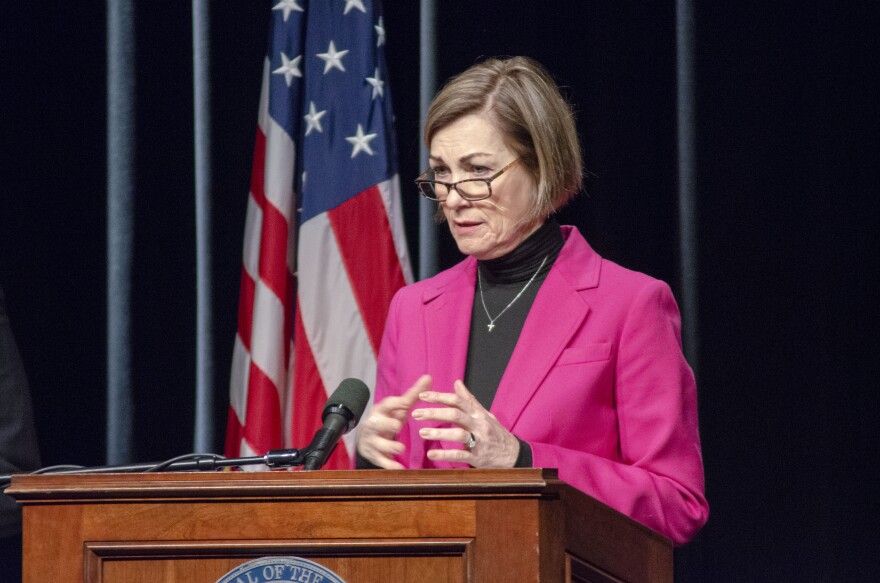State officials say Iowans who are 65 and older as well as some essential workers will be able to get the vaccine starting in early February when the state is slated to start vaccinating people included under phase 1b.
At a press conference Thursday, Gov. Kim Reynolds said the state has put essential workers under phase 1b into five tiers. The first tier includes first responders, law enforcement officers, school staff and child care workers, which consists of an estimated 130,000 Iowans.
The state has also pivoted from its initial recommendation of vaccinating Iowans ages 75 and older under phase 1b, lowering that age cap this week to 65, a move encouraged by both the Trump and Biden administrations.
Reynolds said the state is tentatively going to start vaccinating tier one essential workers and older Iowans on Feb. 1, depending on the number of doses it receives.
But she said she expect vaccination efforts to move slowly as the state is currently 46th in the nation for its allocation of COVID-19 vaccination doses.
Reynolds said the state is getting about 19,500 doses a week, which are going mostly to the state's health care workers. The other half of its allocation is being sent to chain pharmacies who are responsible for vaccinating the state's nursing homes under a federal partnership program.

Reynolds said the chain pharmacies are expected to finish getting the first doses to Iowa's nursing home residents and staff by the end of this month, after which the available number of doses in the state will double, but will still leave it far short of what's needed to get through the estimated more than one million Iowans eligible for the vaccine under phase 1b.
“With our current allocation from the federal government at 39,000 per week beginning Feb. 9, this process is just going to take time," Reynolds said. "Each subsequent tier will be phased in as soon as possible according to the availability of the vaccines and where they're at throughout the state.”
Reynolds said so far the state has received more than 160,000 first doses of the vaccine and had administered more than 106,000 of them, mainly to the state's health care workers.
And she said the vaccination of the state's nearly 450 nursing homes has been "slower than anticipated," but said "significant progress" has been made in the past two weeks.
"We've been assured by the providers that first doses will be completed statewide by the end of the month, and we continue to monitor that daily," she said.
Health care workers and the state's long term care residents and staff are the two groups included under phase 1a.
Reynolds said she's working with Iowa's congressional delegation to figure out why the state's allocation has been lower in comparison to others, especially given the state's comparatively high elderly population.
"And when you consider the number of nursing homes, long term care facilities, and assisted living facilities that we have in the state, and the vulnerable populations that those include, I would hope that we could get our allocation bumped up a little bit," she said.
Until then, state health officials say they're breaking phase 1b into five tiers starting with first responders, school staff and child care workers, followed by food distribution workers and those with developmental disabilities living in congregate settings in tier two, staff working in congregate settings and government officials in tier three, inspectors responsible for hospital, long-term care and child safety in tier four and correctional facility staff and inmates in tier five.
Kelly Garcia, the acting director of the state health department, said there will be a "multi-prong effort" to start distributing vaccines on a "mass scale."
"Some may receive vaccines at their employer and employer-based clinics. Others may receive theirs through local public health, through their health care provider, through a pharmacy or other clinical settings that are equipped to handle screening and scheduling for vaccination efforts," she said.
At the federal level, the Biden administration says it's rolling out a national strategy to fight COVID-19, including the ambitious goal of administering 100 million vaccine doses in his first 100 days in office by increasing the production of the vaccine and creating vaccination distribution centers.






